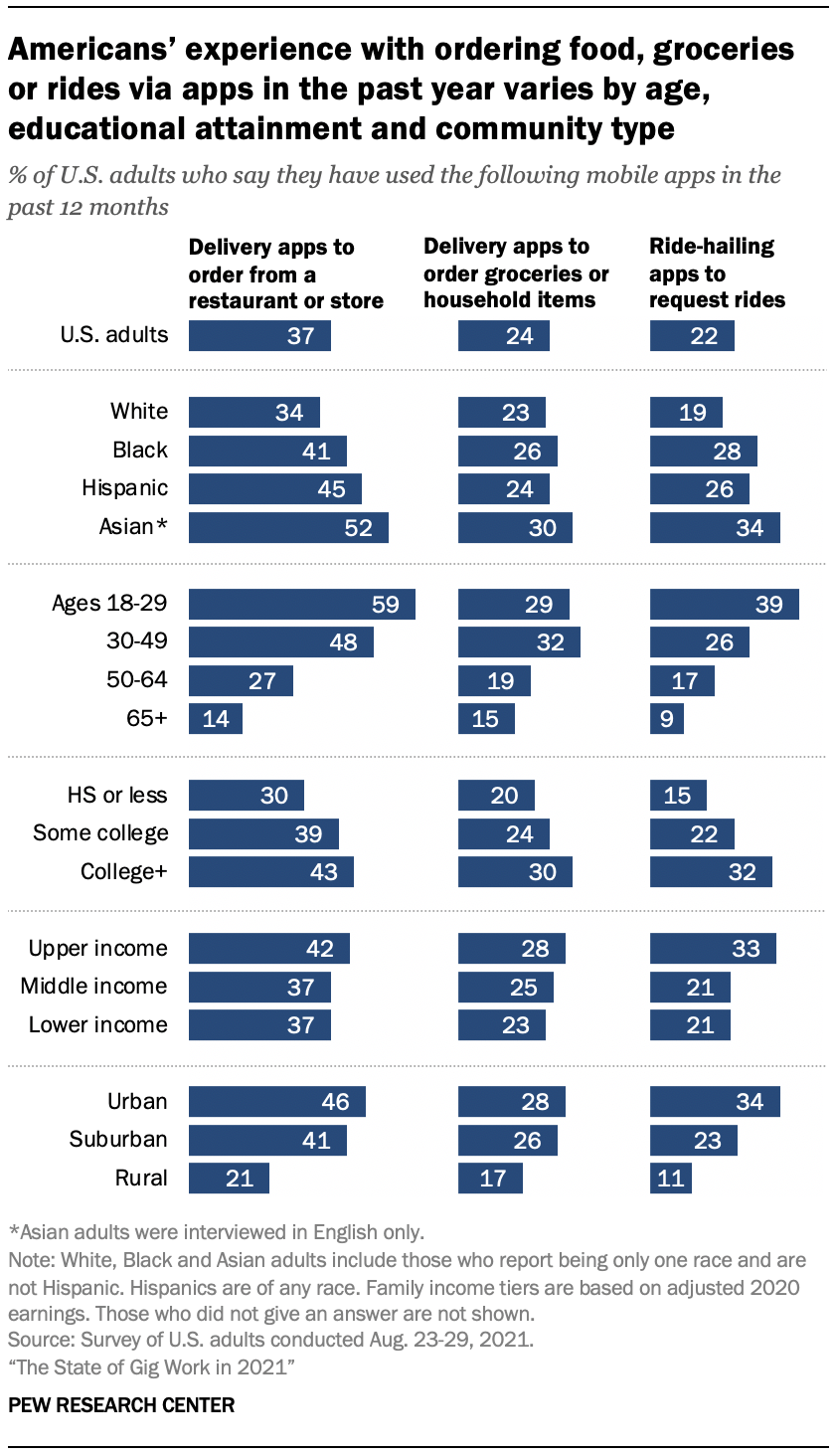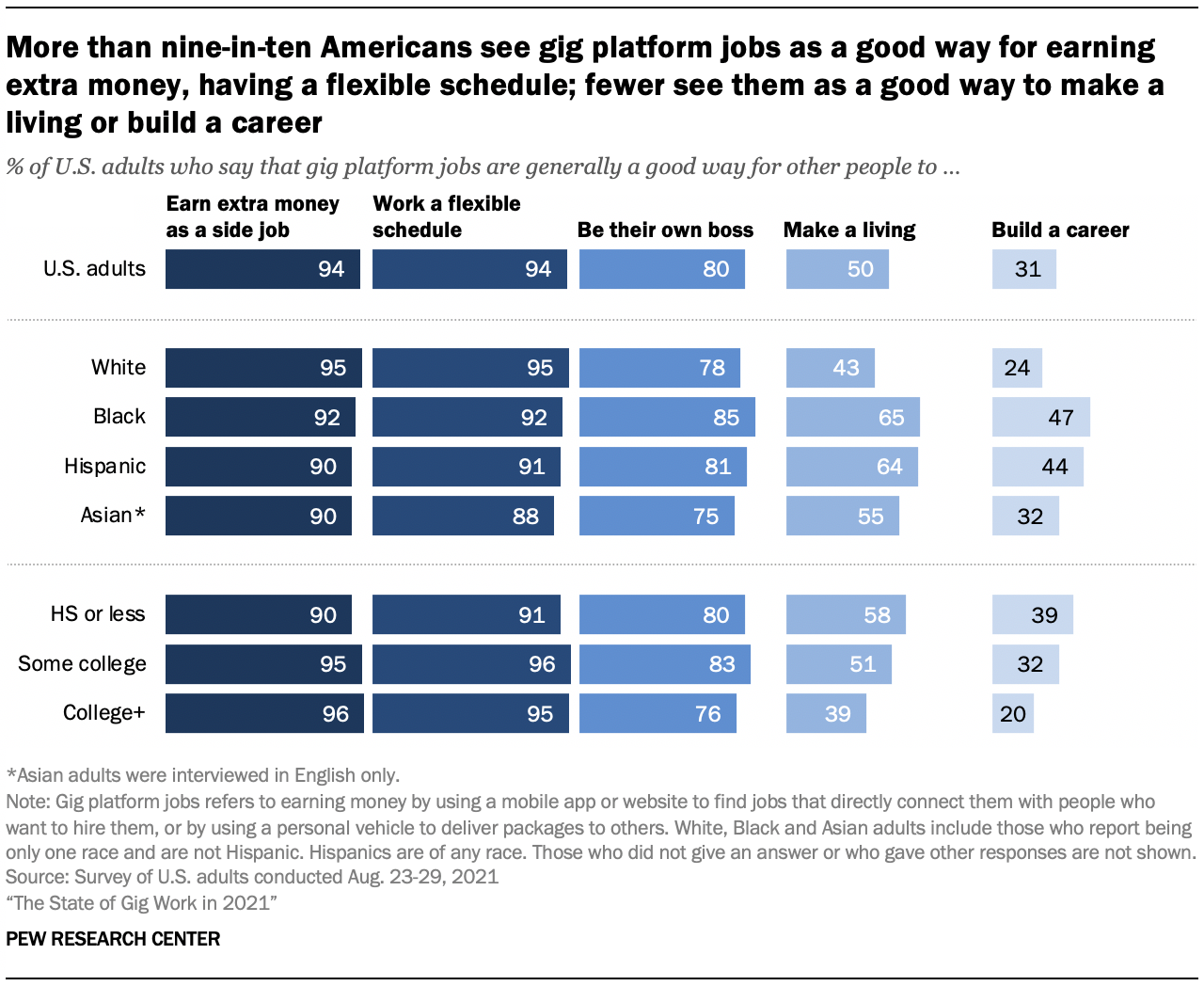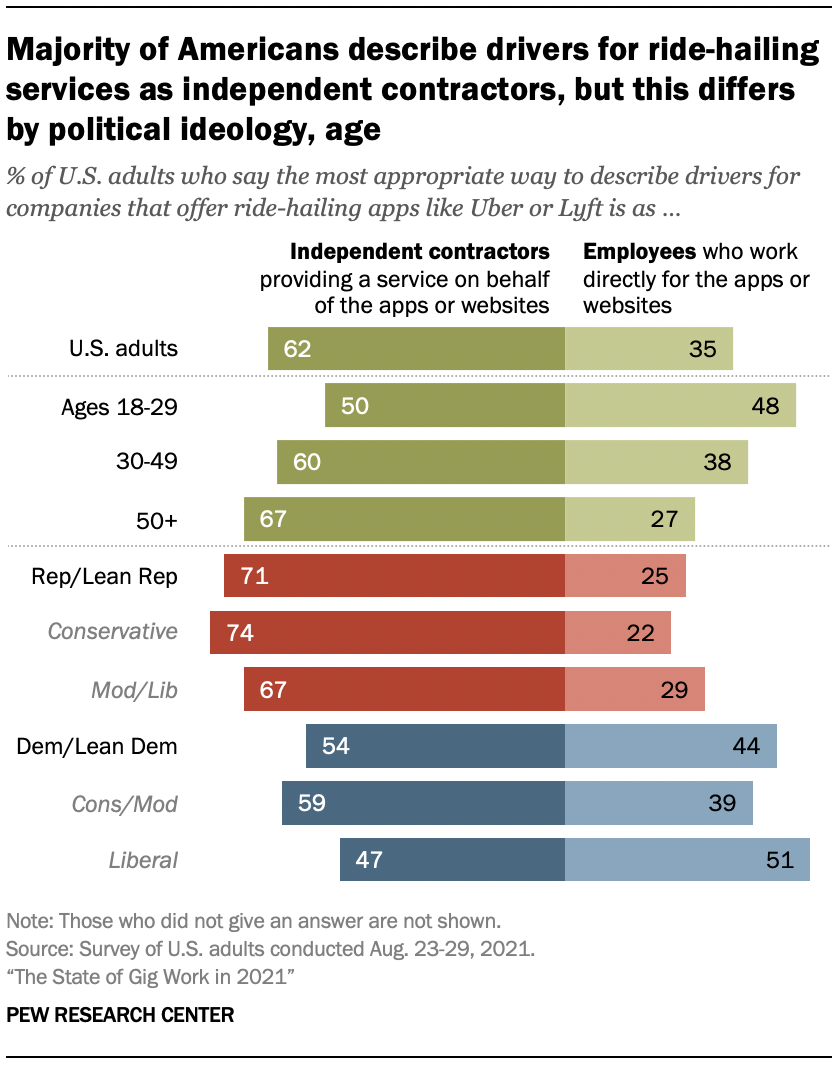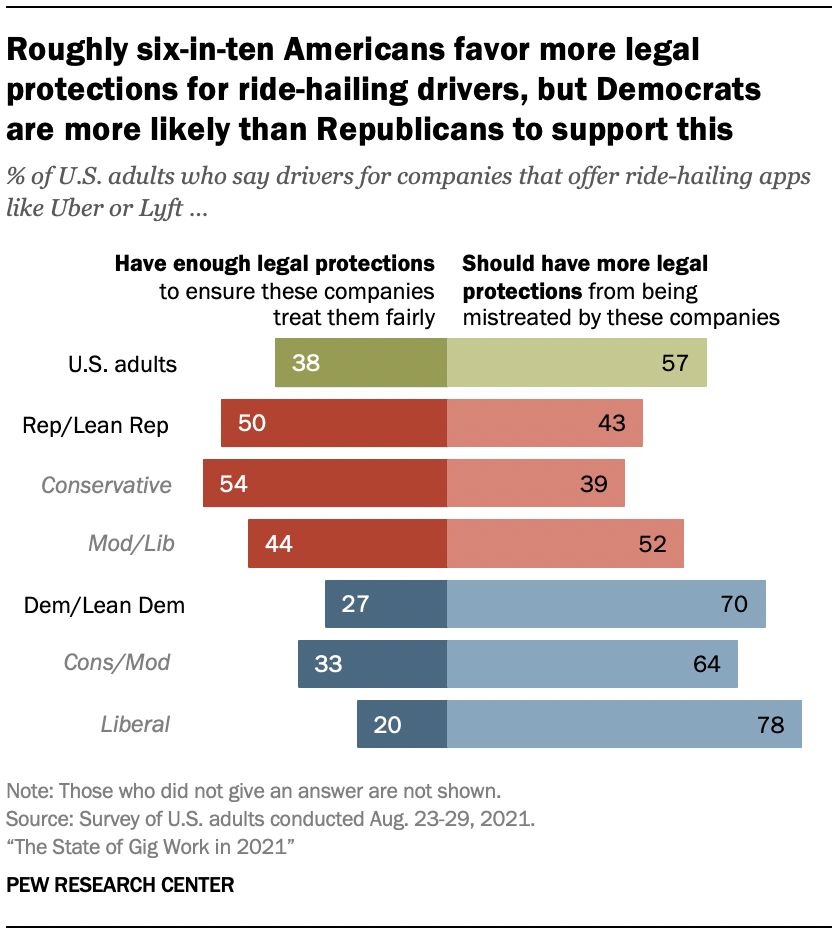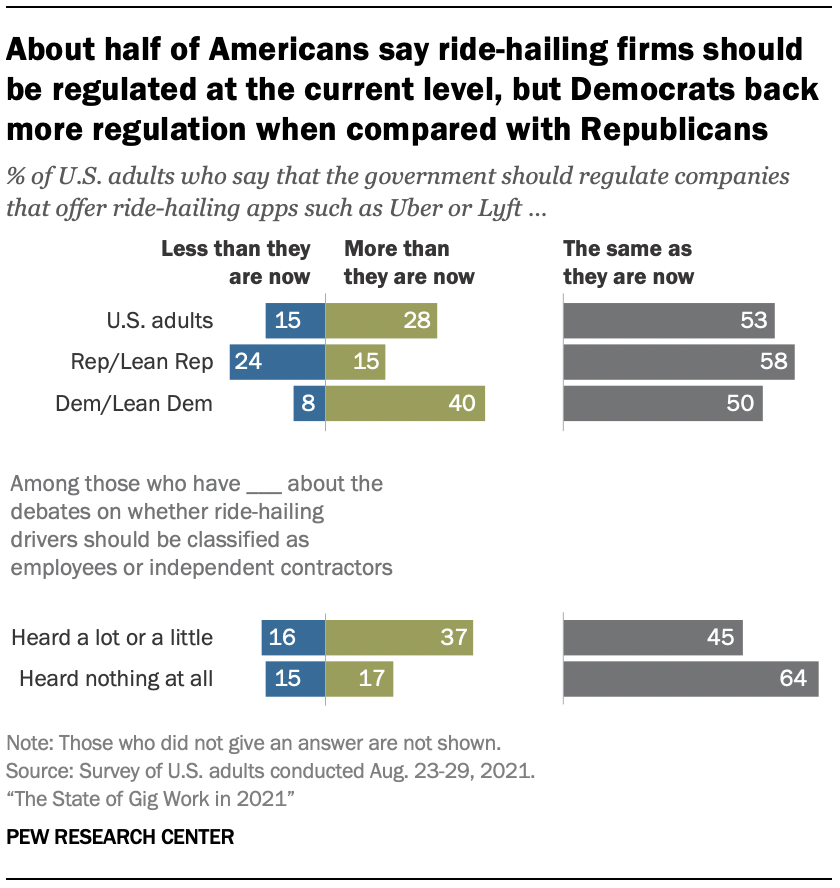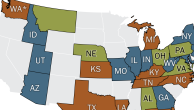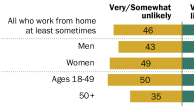In addition to understanding the experiences and attitudes of gig workers, this survey also examines the consumer side of using online platforms to do things like ordering food or requesting rides. Beyond personal usage, Americans also weigh in on ride-hailing companies and their drivers – including whether drivers are or should be considered employees or contractors, and if the government should be regulating this industry more.
37% of adults say they have used delivery apps to order from a restaurant or store in the past 12 months
Some Americans have taken advantage of mobile apps to order meals, groceries and rides in the past year. Overall, 37% of adults say they have used delivery apps to order from a restaurant or store in the past 12 months, 24% say the same for ordering groceries or household items and 22% have used ride-hailing apps to request rides in the same time frame.
Usage of these apps varies by a number of factors, but most prominently by age. For example, 59% of adults ages 18 to 29 say they have used delivery apps to order from a restaurant or store in the past year, compared with 48% of those ages 30 to 49 and smaller shares of those 50 and older.
Similar age differences exist when it comes to using an app to request rides, with adults under age 30 being the most likely age group to report doing this. And when it comes to ordering groceries or other household items via a smartphone, adults under 50 are significantly more likely to say they had used these services during this time period compared with those over the age of 50.
There are also differences by level of education and community type. Americans who have a bachelor’s or advanced degree are more likely than those who have less formal education to say they have used a mobile app to order from a restaurant or store, order groceries or household items or request rides in the past year.
And Americans living in rural areas are less likely than those living in urban or suburban areas to say they have done each of these things in the past 12 months. Suburbanites are also less likely than urbanites to report that they have requested rides via ride-hailing apps or ordered from a restaurant or store via delivery apps in this period, though there are no differences between these two groups when it comes to using apps to have groceries or household items delivered.
More than nine-in-ten Americans think gig platform work is a good way to earn extra money, but are less convinced of its merits for building a career
In addition to understanding people’s experiences with using these kinds of platforms as consumers, the survey also examined their views about those on the other side of the app and found the public had both positive and negative views about earning money through gig platforms.
On the positive side, a vast majority of U.S. adults believe gig platform jobs are a generally good way to earn extra money as a side job or to have the ability to work a flexible schedule (94% each say this). Eight-in-ten also said this is a generally a good way for people to be their own boss.
But even as the public gives gig jobs high marks for flexibility and as a way to earn extra cash, they are less convinced that it is a viable way to make a living or build a career. Half of Americans say earning money through gig platforms is a good way to make a living, while a smaller share (31%) believes these jobs are a good way to build a career. In fact, a majority of Americans (68%) said this kind of work is not a good way to build a career.
Americans’ views on the merits of online gig work vary across race and ethnicity, as well as by educational attainment. While majorities across racial, ethnic and educational groups see this kind of work as a good way to earn extra money, have a flexible schedule or for workers to be their own boss, Black, Hispanic or Asian adults are more likely than White adults to say these types of jobs are a good way to make a living or build a career. Those who have a high school diploma or less are also about 20 percentage points more likely than those with a bachelor’s or advanced degree to say these are good ways to make a living or build a career.
There are modest differences between those who have done this kind of work and those who have not when assessing the merits of these jobs. Those who have never earned money via online gig platforms hold slightly more positive views than those who have done so on the questions of whether gig work is a good way for people to earn extra money as a side job (95% vs. 86%), work a flexible schedule (95% vs. 87%) or be their own boss (81% vs. 76%).
About four-in-ten Americans have heard nothing about debates on how ride-hailing drivers should be classified
The debates surrounding whether ride-hailing drivers should be classified as employees or contractors have been heating up as policymakers take up questions of worker classification. In this survey, 56% of Americans say they have heard at least a little about these debates, while 43% report having heard nothing at all about the issue.
Awareness of these debates varies by educational attainment. Seven-in-ten Americans with a bachelor’s or advanced degree say they have heard at least a little about these debates. That share drops to 54% among those with some college experience and 46% among those with a high school education or less. Those who have ever earned money on online gig platforms are somewhat more likely to say they have heard about the debates (63%) than those who have not earned money in this capacity (55%).
Americans are more likely to say drivers for ride-hailing companies should be classified as independent contractors rather than employees
Lawmakers around the country have debated ride-hailing drivers’ status in recent years as the parent companies and labor groups grapple with whether drivers should be classified as employees or contractors.
This survey finds that a majority of Americans (62%) say the most appropriate way to describe drivers for companies that offer ride-hailing apps like Uber or Lyft is as independent contractors providing a service on behalf of the apps or websites. A smaller share (35%) says these drivers are employees who work directly for the apps or websites.
There is a partisan divide in how the public views this issue. Some 71% of Republicans and independents who lean toward the Republican Party say that these drivers are independent contractors, while a quarter say these drivers are employees who work directly for the companies. By contrast, Democrats and Democratic leaners are more evenly split; but they are still more likely to describe drivers as contractors (54%) than employees (44%).
There are also differences by ideology within each party. Liberal Democrats are more likely than conservative or moderate Democrats to say the most appropriate way to describe drivers who work for ride-hailing apps is as employees. And moderate or liberal Republicans are more likely than conservative Republicans to say these drivers are employees.
Americans’ views on the status of ride-hailing drivers also differ by age. Some 48% of adults ages 18 to 29 say the most appropriate way to describe drivers is as employees, compared with 38% of those ages 30 to 49 and even smaller shares of those 50 and older (27%).
Many state governments are deliberating over the status of ride-hailing drivers – including in California where voters and courts have weighed in. In New York, ride-hailing companies have attempted to negotiate with labor groups who oppose classifying drivers as contractors by offering bargaining rights and some employment benefits. And in Massachusetts, lawsuits have aimed to categorize ride-hailing drivers as employees while other proposals seek to classify them as contractors and expand benefits.
There are only modest differences in Americans’ views on the most appropriate way to classify ride-hailing drivers based on their awareness of these debates. Some 37% of adults who had heard a lot or a little about these debates say drivers are best described as employees, compared with 32% of those who have heard nothing at all.
There are sizeable partisan differences when it comes to views on whether ride-hailing drivers should have more legal protections
Debates over whether drivers should be classified as employees or contractors are tied to conversations about what legal protections that should be afforded to drivers. Experts on the subject say that in many cases, classifying drivers as employees would mean they would be eligible for certain benefits from their employers, such as minimum wage, unemployment insurance and overtime wages.
When asked whether drivers for ride-hailing companies have enough legal protections, a majority of Americans say they should have more protections. Fully 57% of U.S. adults say drivers for ride-hailing apps should have more legal protections from being mistreated by these companies, while 38% think drivers have enough legal protections to ensure these companies treat them fairly.
As was true with classification of ride-hailing drivers, Americans’ views of legal protections for these workers differ by party and ideology. Seven-in-ten Democrats say drivers should have more legal protections, while the share of Republicans who say the same is roughly 30 percentage points lower (43%). There are also significant differences based on ideology. Some 54% of conservative Republicans say drivers have enough legal protections, compared with 44% of moderate or liberal Republicans. Within the Democratic Party, conservatives or moderates are similarly more likely than liberals to say drivers have enough legal protections (33% vs. 20%), although both groups say so at lower rates than Republicans.
The view that drivers should have more protections is more commonly held by younger rather than older Americans. Some 68% of those ages 18 to 29 say drivers should have more legal protections, compared with 61% of those ages 30 to 49 and 50% of those 50 and older. It should be noted, however, that 8% of adults ages 50 and older did not answer this question.
Awareness of debates on the status of ride-hailing drivers also relates to views on protections. Adults who have heard at least a little about these debates are more likely than those who have heard nothing at all to say drivers should have more legal protections (62% vs. 51%).
Roughly half of Americans say the amount of government regulation should be the same as it is now for ride-hailing companies
Although a majority of Americans say drivers should have more legal protections to prevent mistreatment, only a minority are in favor of regulating ride-hailing companies more than they are now.
When asked about government regulation of these companies, the largest share (53%) prefers the status quo, saying that the government should regulate companies that offer ride-hailing apps the same as they are now. Another 28% say the government should regulate the companies more than they are now, while smaller shares support less regulation (15%).
Large divides exist by party. Four-in-ten Democrats say the government should regulate these companies more than they are now, compared with 15% of Republicans. Still, half or more in each political party think the amount of regulation should stay at its current level.
Those who have heard a lot or a little about debates on whether drivers are employees or independent contractors are also 20 points more likely than those who have heard nothing at all about these debates to say the government should regulate these companies more (37% vs. 17%). Similar shares of these groups say the government should regulate companies offering ride-hailing services less than they are now.
